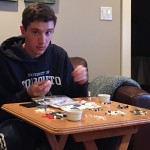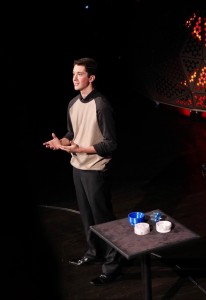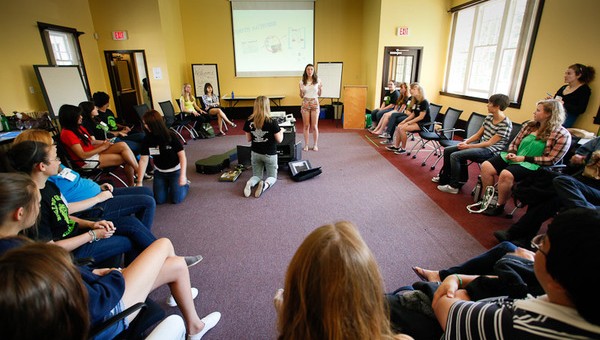Issues & Community Blog - Andrew Weaver: A Climate for Hope - Page 116
Introducing Bill M236 — Environmental Bill of Rights Act, 2016
Today in the Legislature I introduced a bill intituled Environmental Bill of Rights Act, 2016.
This Bill specifically states that British Columbians have a right to a healthy environment and that it is the government’s responsibility to protect it for this generation as well as those to come. There are five key components to this Bill. The Bill:
- outlines the Rights and Responsibilities of the BC Government and its residents when it comes to environmental decision making;
- creates a publicly accessible one-stop-shop for environmental information;
- ensures that all ministries consider the environmental impacts their operations may be responsible for;
- creates an environmental commissioner responsible for investigating violations, providing the public an opportunity to participate in and access the decision making process, and providing regular reports about the state of the B.C. environment.
- protects whistle blowers who act to prevent or mitigate environmental damage.
I am no longer confident that the next generation of British Columbians will enjoy the same opportunities that we have today. The problem is that governments are frequently pitting the environment against industry and it doesn’t have to be that way.
The rhetoric that we hear in this province — the forces of no,’ ‘get to yes’ no matter what the question is — is not helpful to anybody, despite the fact that it’s a great sound bite. The intention of my bill is to create the rules in which industry can operate. Industry has crying out for this; the last thing industry wants is uncertainty. They want to know what the rules are. They want to know what the penalties are. They want to know how they can do business in British Columbia.
Municipalities in BC have recently expressed significant support for an Environment Bill of Rights Act, including 47 who have made a declaration affirming British Columbians rights to a healthy environment (in response to the Blue Dot Tour), as well as passing an endorsement at the 2015 UBCM Convention for a provincial bill outlining the same.
It’s time that we moved on from the outdated thinking that every environmental law brought forward is somehow an attack on industry. I have visited projects across British Columbia and the most successful businesses, which also create the greatest benefits for their local economy, are those that account for their impacts on the environment. This should become the norm for anyone who wants to do business in B.C.
Below I reproduce the video and text of the introduction of my bill. I also reproduce the accompanying media statement.
Video of my Introduction
Text of my Introduction
A. Weaver: I move that a bill intituled Environmental Bill of Rights Act, 2016, of which notice has been given in my name, be introduced and read a first time now.
Motion approved.
A. Weaver: Over the past decade, British Columbia has seen steadied erosion of the environmental laws in our province. The lack of any significant climate action from this province is a clear example. By outlining the rights and responsibilities of the B.C. government and the citizens of British Columbia, this bill is designed to complement and expand upon the existing legislation used when decisions impact the environment.
This bill reinforces British Columbians’ right to a healthy environment and the government’s responsibility to protect it for this generation and those to come. A version of this legislation has already been passed in five legislatures across Canada: Ontario, Quebec, Yukon, Nunavut and Northwest Territories.
Furthermore, 47 municipalities in British Columbia have already made declarations concerning their citizens’ rights to a healthy environment. This was reaffirmed at the UBCM convention last fall when a motion was endorsed to call for legislation that grounded this right in environmental law.
I visited resource development projects across British Columbia. The most successful of these, which also create the greatest benefits for their local economy, are those that account for their impacts on the environment. This should become the norm for anyone who wants to do business in B.C.
The Environmental Bill of Rights Act introduces a number of new policy measures that will assure increased transparency and access to environmental decision-making and create a stronger framework for British Columbians to be included in environmental decisions made in this province.
I move that the bill be placed on the orders of the day for second reading at the next sitting of this House after today.
Bill M236, Environmental Bill of Rights Act, 2016, introduced, read a first time and ordered to be placed on orders of the day for second reading at the next sitting of the House after today.
Media Statement
Media Statement: May 16, 2016
Environmental Bill of Rights Act introduced by Andrew Weaver
For Immediate Release
Victoria B.C. – To safeguard the right of current and future generations to a healthy environment, British Columbians must be able to effectively engage with the provincial government’s duty to protect the environment under its jurisdiction – and to hold the government accountable when they fail to do so, says Andrew Weaver, MLA for Oak Bay – Gordon Head and Leader of the BC Green Party.
In order to accomplish this, today in the legislature Dr. Weaver introduced the Environmental Bill of Rights Act. By outlining the rights and responsibilities of the BC Government and the citizens of British Columbia this bill is designed to complement and expand on the existing legislation used when decisions impact the environment. The bill reinforces British Columbians’ right to a healthy environment and the Government’s responsibility to protect it for this generation and those to come.
“It’s time that we moved on from the outdated thinking that every environmental law brought forward is somehow an attack on industry,” said Weaver. “I have visited projects across British Columbia and the most successful businesses, which also create the greatest benefits for their local economy, are those that account for their impacts on the environment. This should become the norm for anyone who wants to do business in B.C.”
A number of Canadian jurisdictions have enacted similar legislation including Ontario, Quebec, Yukon, Nunavut and the Northwest Territories. In addition, 47 municipalities across British Columbia have passed municipal declarations supporting the right to a healthy environment. A similar declaration was endorsed at the UBCM Conference last fall, which called on the provincial government to enact a provincial environmental bill of rights.
“While we talk a big game in this province about our environmental protections, the fact is that our environmental laws have eroded over time,” said Weaver. “I am no longer confident that the next generation of British Columbians will enjoy the same opportunities that we have today, and I am concerned with the burden we place on them when rushed processes and projects cause unnecessary environmental damage.”
The Environmental Bill of Rights Act introduces a number of new policy tools which will ensure increased transparency and access to environmental decision-making and create a stronger framework for British Columbians to be included in environmental decisions made in this province.
Any decisions involving environmental matters would be documented in a new, publicly accessible, online registry. Currently only certain types of information are available in a generally piecemeal format.
The Bill also creates a new independent Commissioner of the Environment, who is responsible for investigating violations, providing the public an opportunity to participate in and access the process, and providing regular reports about the state of the B.C. environment.
“Frankly, I think it’s time that British Columbians were given more tools to ensure that their province doesn’t just talk a good game about protecting the environment – but is actually doing the job they are elected to do,” said Weaver.
-30-
Media Contact
Mat Wright – Press Secretary Andrew Weaver MLA
1 250 216 3382
mat.wright@leg.bc.ca
GMOs: An Update and Potential Ways Forward in BC
Introduction
Since writing our first backgrounder, we have continued to research the issues surrounding genetically modified foods, and the legislative options available in the BC context. The issue of GMOs is broad and complex and is tied to many larger questions including: our relationship to our food, the effects of large-scale conventional agriculture on human and animal health and the environment, population growth, global warming, industry funding of science, technological advance and its associated risks, and our ability to ensure a sustainable and secure food supply for the future. It is important to be cognizant of these broader issues in developing a response to GMOs, to ensure a well informed and holistic response that does not have unforeseen adverse consequences. We must also work within the context of BC, using the tools we have at our disposal to most appropriately and effectively respond to the issues and questions associated with GMOs.
Jurisdiction
Health Canada and the Canadian Food Inspection Agency (CFIA) share responsibility for food policies on health and safety, regulation, and labelling. The BC Liberal government has said that the responsibility for GM products rests solely with the Federal Government (see here and here and here).
However, in 2001, the BC NDP argued that GM labelling is a consumer information matter, which falls under provincial jurisdiction according to the Constitution Act (1867). During second reading of Bill 18 Genetically-Engineered Food Labelling Act, NDP Attorney General Graeme Bowbrick noted “The province has jurisdiction to legislate on a matter of property and civil rights, which is interpreted to include the authority to legislate with regard to consumer protection and consumer information.”
The Food and Agricultural Products Classification Act (2016) gives the Lieutenant Governor in Council the power to make regulations establishing or adopting certification programs, including making regulations respecting the quality standards of food or agricultural products. However, provincial certification will only apply to operators producing and selling their products within BC; those that sell their produce to other provinces will still require federal certification.
In order to fall within BC’s jurisdiction, the impact of any legislation must only be felt within BC and it must not have the effect of prohibiting or controlling the importation of goods into the province. Otherwise, legislation would infringe upon federal jurisdiction over inter-province trade and commerce and therefore be invalid.
Regarding pesticides, a province may prohibit the use of a registered pesticide, or it may add more restrictive conditions on the use of a product than those established under the Pest Control Products Act. This may provide a relevant parallel for the Province’s ability to restrict GM crops that have been approved Federally, or to impose stricter regulations on the use of GM crops within the province.
Effects and Costs of Mandatory Labelling
The BC NDP estimated that mandatory labelling would cost $11.8 million (in today’s dollars; see Note 1 below), which equals 0.1% of total retail food sales in BC. If implemented, mandatory labelling in BC could result in nation-wide labelling by companies, as is happening in the US, where Vermont labelling legislation (going into effect on July 1st, 2016) has led to large companies – including General Mills, Mars and Kellogg – to label their products nationwide.
Potential Ways Forward in the BC Context
Many potential legislative responses to GMOs fall under federal jurisdiction, including the approval and regulation of GM crops for growth and sale in Canada.
In BC, two key responses may be warranted. First, the Ministry of Agriculture could establish a robust tracking and monitoring regime, to track where GM crops are grown in BC, and to pro-actively monitor any actual or potential environmental and agricultural effects of GM crops. The Province does not currently track or monitor GM crops in BC. If any action is warranted, we must first identify and fully understand the scope and impact, if any, of GM crops in our province.
Second, BC should establish an expert panel, made up of independent researchers, to assess the current and potential future impacts of GM agriculture in BC, and to assess the jurisdictional ability, logistics, and costs of implementing mandatory labelling in BC or of increasing the regulation or restriction of GM imports into BC. Independence is important since many studies on GMOs are industry funded, but not all. Some evidence suggests that industry funding systematically biases studies towards favourable outcomes (see Note 2)
So what do you think?
Please continue to share your thoughts on what we should do in BC to address potential or perceived concerns associated with certain GM crops.
Note 1: adjusted 2001 NDP estimate ($9 million) for inflation (BC Ministry of Public Safety and Solicitor General, Regulatory Impact Statement, April, 2001)
Note 2: Healthy People and Communities—Steering Committee, Multi-Sectoral Partnerships Task Group, 2013: Discussion Paper: Public-Private Partnerships with the Food Industry;
Ayevard, P., D. Yach, A.B.Gilmore, and S. Capewell, 2016: Should we welcome food industry funding of public health research? The BMJ, 2016, 353:i2161. doi: 10.1136/bmj.i2161.
Celebrating youth in our community – Nathan Kuehne
This is the 23rd in our series of stories celebrating the outstanding accomplishments of youth in our community. These inspirational young adults are enriching our lives with their passion and commitment to the betterment of society.
Nathan Kuehne
 It seems like just yesterday that I met Nathan as a young lad in Mr. Brooks’ Grade 5 boys class on the beach campus of Glenlyon Norfolk. In what feels like a blink of the eye, he’s 18 and now graduating from Grade 12 in a few months. Nathan is what’s termed a “lifer”, having attended Glenlyon Norfolk ever since Kindergarten. He’s an exceptional student with a passion for science and since Grade 9 he has competed at a very high level in Science Fairs. Nathan presently serves as Head Boy of the school this year and so serves as a role model and an ambassador for the school. He is also involved in the organization of numerous student activities including co-organizing weekly assemblies.
It seems like just yesterday that I met Nathan as a young lad in Mr. Brooks’ Grade 5 boys class on the beach campus of Glenlyon Norfolk. In what feels like a blink of the eye, he’s 18 and now graduating from Grade 12 in a few months. Nathan is what’s termed a “lifer”, having attended Glenlyon Norfolk ever since Kindergarten. He’s an exceptional student with a passion for science and since Grade 9 he has competed at a very high level in Science Fairs. Nathan presently serves as Head Boy of the school this year and so serves as a role model and an ambassador for the school. He is also involved in the organization of numerous student activities including co-organizing weekly assemblies.
 Nathan has had a love of science for as long as he can remember. In Grade 9, he qualified for the National Science Fair after placing 6th in the Regional Science Fair, where his project involved the use of charcoal in soil to help plants grow. It was at the Regional Science Fair that he met a Grade 12 student who inspired and “wowed” him with his university level research. The Grade 12 student captivated Nathan and made him feel empowered, wondering to himself “how far can I go with this?” And indeed he has gone a very long way already.
Nathan has had a love of science for as long as he can remember. In Grade 9, he qualified for the National Science Fair after placing 6th in the Regional Science Fair, where his project involved the use of charcoal in soil to help plants grow. It was at the Regional Science Fair that he met a Grade 12 student who inspired and “wowed” him with his university level research. The Grade 12 student captivated Nathan and made him feel empowered, wondering to himself “how far can I go with this?” And indeed he has gone a very long way already.
 After his inspirational experience at the competition in Grade 9, Nathan undertook a science project in Grade 10 that looked at detecting multiple types of cancer though a urine sample. His goal was to make testing for cancer easier and cheaper.
After his inspirational experience at the competition in Grade 9, Nathan undertook a science project in Grade 10 that looked at detecting multiple types of cancer though a urine sample. His goal was to make testing for cancer easier and cheaper.
Nathan noted that he has had the benefit of an outstanding teacher mentor, Ms. Dallin, at Glenlyon Norfolk. Ms. Dallin has put in countless volunteer hours to support Nathan, including time during the summer months when Nathan consulted with a professor at the University of Victoria on his research. His Grade 10 science project landed him a spot on Team BC and a Gold Medal at the Canada wide Science Fair (in the Top 10 nationally).
 In Grade 11, Nathan carried his research further with a project on Phenylketonuria (PKU), a rare inherited disorder that causes an amino acid to build up in the body. He presented a platform for disease detection that is inexpensive, accessible and will screen for many diseases. He presented a chemical protocol in looking for amino acids (which are elevated with diseases). The title of his project was “pH-Dependent Colorimetric Assays for Biomarking Amino Acids”. He received the President’s Award for 1st Place Overall at the Vancouver Island Regional Science Fair and a Gold Medal at the National Science Fair. Nathan was a TedX Victoria speaker in 2015 called “DIY Diagnostic: A Life-Changing Test for PKU Patients”.
In Grade 11, Nathan carried his research further with a project on Phenylketonuria (PKU), a rare inherited disorder that causes an amino acid to build up in the body. He presented a platform for disease detection that is inexpensive, accessible and will screen for many diseases. He presented a chemical protocol in looking for amino acids (which are elevated with diseases). The title of his project was “pH-Dependent Colorimetric Assays for Biomarking Amino Acids”. He received the President’s Award for 1st Place Overall at the Vancouver Island Regional Science Fair and a Gold Medal at the National Science Fair. Nathan was a TedX Victoria speaker in 2015 called “DIY Diagnostic: A Life-Changing Test for PKU Patients”.
Nathan is one of two students from BC who was selected to compete at the recently held Intel International Science and Engineering Fair in Phoenix, Arizona.
 Nathan has been the recipient of many academic awards and scholarships, including top academic awards in Grades 9 to 11, the Glenlyon Norfolk Alumni Association Scholarship for academic success and contribution to the school and a Recognition Award for Excellence in International Baccalaureate Personal Project.
Nathan has been the recipient of many academic awards and scholarships, including top academic awards in Grades 9 to 11, the Glenlyon Norfolk Alumni Association Scholarship for academic success and contribution to the school and a Recognition Award for Excellence in International Baccalaureate Personal Project.
It did not surprise us to learn that Nathan has a long term goal of undertaking medical research. He has won a variety of scholarships, including the prestigious Chancellor’s Scholarship at Queen’s University and a National Scholarship at the University of Toronto, offered annually to approximately ten students from across Canada.
 In addition to his passion for science, Nathan has other interests. He speaks five languages: English, Russian, German, Spanish and French (at varying levels of proficiency, he notes). He played basketball on the school team this year and he enjoys movies and hiking with friends. He loves working as a volunteer with younger students who love science. His hope is to inspire them the same way he was inspired by an older student when he was in Grade 9. Another of Nathan’s passions is Ukrainian dance – he has been dancing and competing since age 10. Now, he also teaches Ukrainian dance to 8 to 10 year olds at Victoria’s Veselka Dance group.
In addition to his passion for science, Nathan has other interests. He speaks five languages: English, Russian, German, Spanish and French (at varying levels of proficiency, he notes). He played basketball on the school team this year and he enjoys movies and hiking with friends. He loves working as a volunteer with younger students who love science. His hope is to inspire them the same way he was inspired by an older student when he was in Grade 9. Another of Nathan’s passions is Ukrainian dance – he has been dancing and competing since age 10. Now, he also teaches Ukrainian dance to 8 to 10 year olds at Victoria’s Veselka Dance group.
Nathan is a very engaging young man who has already accomplished a great deal and will no doubt go on to do ground-breaking medical research. His love of science, his intelligence and high degree of motivation will carry him far and we look forward to hearing a lot more about Nathan’s accomplishments in the future.
Fighting for my Right to do the Job the Official Opposition Leader did not do
Last week I argued that the Leader of the Official Opposition acted in a cowardly fashion in attempting to shut down estimates of the Office of the Premier. I pointed out that it was cowardly for two reasons. First, the fact that the Leader of the Opposition would run away from an opportunity to question the Premier on a diverse array of issues is cowardly. It’s his job to do so. It certainly appears that he is afraid of challenging the Premier face to face.
If the Leader of the Opposition is afraid, that’s one thing. I was not afraid. I would have been willing to take much more than my allocated time on Thursday if extra time was available. I had prepared six longer primary questions (which would spin off into numerous smaller follow ups). I had other secondary questions that I would have loved to raise on a diverse range of topics, from housing through social services through education and so forth. And this brings me to the second reason why I think it’s cowardly.
Just because the Leader of the Opposition no longer wants to ask questions does not give him the right to go against a long standing tradition of organized time allocation and take away my right as well. The people of British Columbia deserve better leadership and better opposition.
Today in the Legislature I rose on a point of order. As you will see from my Point of Order, it is my view that the estimates of the Office of the Premier have not yet concluded due to a procedural error. Once more, the BC NDP asked the Chair to not allow me time.
The text and video of my point of my point of order are reproduced below. At the end, I once more link the Video showing proceedings that closed Premier’s estimates.
UPDATE:
On Tuesday, May 17 the Chair provided a very thoughtful and thorough analysis in ruling against my point of order. I appreciate the work that went into it. I have reproduced the ruling at the end of this post.
Text of my Point of Order
A. Weaver: I rise on a point of order. This is the first time I have been able to rise on this point of order for two reasons. First, on Thursday of last week, I spent much of the day in communications with a variety of offices to determine what transpired with respect to the closing of debate on estimates for the Office of the Premier. I also only received the relevant Hansard clip on Friday.
As I’d mentioned to the Speaker’s office on Thursday last week, my office had coordinated through the Opposition House Leader’s office that I would be speaking to the Premier’s estimates. It was agreed that I would rise early Thursday morning.
Between 6:20 and 6:25 on Wednesday last week, at 292 minutes, 14 seconds of the online Hansard video on May 11, the Premier rose in estimates and stated the following: “With that, Mr. Chair, I rise to report progress and ask leave to sit again.” The Chair then said this: “Hon. members, you heard the motion. All in favour say aye.” The motion carried.
At this point, the committee had risen, and it was very clear that the Chair left his seat. There appeared to be some commotion in the chamber after the passing of this motion. Conversations went back and forth between the Premier and the Leader of the Official Opposition. The Chair remained standing during these conversations. Some notes got passed around. The Clerk also stood to speak with the Premier. The Chair returned to his seat but said nothing while the Clerk was standing and speaking to the Premier.
Eventually the Chair issued a single word. “Premier,” he said. At this point the Premier is audibly heard on Hansard saying: “It’s not mine.” She’s referring to a motion written on a piece of paper that had been passed to her. The Premier then says the following: “By agreement with the opposition, I move that the committee rise and report completion of the resolution and ask leave to sit again.” After this motion passes, the Premier states this: “Are you sure that was legally done?”
In my view, there is a very clear procedural error here. The Chair at no time called the committee back to order while sitting in the chair. Since the earlier motion to rise and report progress had indeed passed, the second motion regarding completion would, in my view, be out of order, as the committee had not been called to order again. It had simply risen.
As such, it is my view that the estimates of the Office of the Premier have not yet concluded. Hon. Chair, I would kindly ask that you consider these comments and consider providing a ruling to this House at a later time. Thank you for your consideration of this very important matter.
M. Farnworth: This is not a procedural point of order. In fact, it would be classed as argument. So, hon. Chair, I respectfully ask that you rule that this is, in fact, not a point of order.
The Chair: Hon. Members, I would take the member’s point of order on advisement. Thank you.
Video of my Point of Order
Video Close of Proceedings on May 11
Point of Order — Chair’s Ruling
The Chair: Before I recognize the Minister of Finance, I have a statement to make.
On Monday, May 16, at the commencement of Committee of Supply, Section B, the member for Oak Bay–Gordon Head rose on a point of order regarding the conclusion of estimates of the Office of the Premier on Wednesday, May 11. I have reviewed the Votes and Proceedings, the Hansard transcript and the video of the proceedings in question.
I acknowledge the question the member raised, but I do not agree that the Committee of Supply was not properly constituted and that, therefore, it could not consider or adopt the motion regarding Vote 10, the 2016-17 estimates for the Office of the Premier.
The proceedings unfolded as follows. An initial motion was moved by the hon. Premier that the committee “rise, report progress and ask leave to sit again.” The Chair put the motion to the committee, and the motion was carried. Normally, the presiding officer would leave the chair and report to the Speaker. However, that did not occur.
Although the presiding officer rose briefly, he was immediately advised that it was the will of the committee to complete consideration of the estimates of the Office of the Premier. At that point, the committee had not formally closed proceedings, nor did the Chair declare that the committee was adjourned. In addition, Office of the Premier staff remained in the Chamber, though it is required that all public servants must depart immediately upon the adjournment of Committee proceedings.
The presiding officer resumed formal proceedings and recognized the Premier, who moved the motion to report completion of the estimates for the Office of the Premier. This motion, and the motion to approve Vote 10, were duly adopted with consent of the committee had altered its original decision to report progress by unanimous agreement of all members duly present and assembled in the chamber at that time.
The Chair did not call the committee back to order, as a recess or adjournment had not been declared. There had simply been a pause in the proceedings in order to confer and clarify with committee members on the status of business. This is not an unusual practice, as presiding officers often will consult informally with members during proceedings to clarify the status of business under consideration or to coordinate matters relating to the management of parliamentary business.
While the video recording captured the informal discussions of members, pursuant to the longstanding Hansard transcript practice they were clearly not part of the formal proceedings. Further, it should be noted that during the entire proceedings, the mace remained in the lowered position, indicating that the House was in committee. In addition, the Speaker had not resumed the chair nor received a report from the committee.
In other words, at all times during the closing of the estimates of the Office of the Premier, the Committee of Supply remained constituted. The presiding officer followed the correct procedure to continue in committee and allow the will of the committee to be respected. It is immaterial that the informal discussion among members to complete the estimates occurred off the record and were recorded on video as interjections.
The Chair heard these discussions and continued to preside in Committee of Supply, rather than reporting to the Speaker. The Premier’s final motions were moved with the unanimous consent of the Members present, were deemed in order and duly passed.
Accordingly, the remainder of the proceedings and the closing of the Estimates of the Office of the Premier on May 11 were in order.
Thank you.
A. Weaver: I just wish to thank you for a very thoughtful and thorough analysis of my point of order, and I do appreciate the work that went into it.
Muzzling the BC Greens — Standing up for Our Democracy
Once more the BC NDP blocked me from participating in a debate. Today we were to debate the following resolution:
15 Mr. Heyman to move —
Be it resolved that this House recognize that Power BC is a modern strategy to build the economy, create jobs and meet B.C.’s energy needs while reducing our impact on climate change.
While I obviously had a few things I could say to this motion, I want to emphasize the highlight of the morning was Vicki Huntington, MLA for Delta South, standing up on a point of order regarding the rights of independent members to participate in these debates and not be shut down by the opposition.
Below is her must-watch video.
Video of MLA Huntington’s Point of Order
Prior to this Minister of Agriculture called for Private Member’s Motion 14 to be debated.
As noted by the Deputy Speaker, “unanimous consent is required to proceed with Motion 14 without disturbing the priorities of the motions preceding it on the order paper.” Unanimous consent was given.
But here’s the problem, Motion 14 stated this:
“Be it resolved that this House recognize the accomplishments and success of B.C.’s Skills for Jobs Blueprint.”
The motion carried and then George Heyman rose and spoke to Motion 15 (which hadn’t actually been called).
After George delivered his address, the Deputy Speaker stated:
Deputy Speaker: Hon. Members, we have to clarify the motion. It was moved as Motion 14. It’s supposed to be Motion 15. House Leader, could you please move Motion 15?
Hon. N. Letnick: I’m happy to move Motion 15.
Deputy Speaker: Hon. Members, unanimous consent of the House is required to proceed with Motion 15 without disturbing the priorities of the motions preceding it on the order paper. Is consent granted?
I did not grant leave which meant that unanimous support was not received. After a short recess, the Deputy Speaker noted this:
Deputy Speaker: We have received unanimous consent for Motion 14, so we are going to proceed with Motion 14. The member for Vancouver-Fairview already has spoken on that.
And so the debate on Motion 14 resumed.
As noted at the top of this post and in Vicki Huntington’s video, yet again the BC NDP did not want to grant me speaking time. I had contacted the opposition house leader on Friday requesting a position in the speaking order. On Saturday evening I received an email saying this wasn’t in the cards.
While normally I would not have fought back, in this case, I felt compelled to do so. I had tried once before to enter a Monday morning debate on the Kinder Morgan pipeline and was blocked by the NDP on that too. But this latest one came right on the heels of me being shut out in Premier’s estimates.
For those interested, the BC NDP’s PowerBC plan is hardly a modern strategy to build the economy, create jobs and meet B.C’s energy needs while reducing our impact on climate change. It is 449 words long and is supported by a 420 word backgrounder. Combined, that’s the length of an opinion piece on a newspaper editorial page. It reads more like a sequence of political talking points rather than a comprehensive plan.
Don’t get me wrong, the BC Liberals have no jobs plan to transition us to a low carbon future either. They are still doubling down on their reckless desperate venture in search of an LNG investment. It’s because of their myopic view to hit an LNG home run that the Canadian Wind Energy Association recently packed up and left British Columbia. We should be using our existing dams and bringing intermittent sources of power together with these dams to actually stablize the base demand.
It’s because of this BC Liberal myopic view that a $1 billion US investment walked from British Columbia — walked from Vancouver Island. There was to be a partnership between five First Nations, TimberWest and EDP Renewables to build wind capacity on Vancouver Island in close proximity to demand for electricity thereby reducing substantive transmission loss.
I agree wholeheartedly in the need to transition to a low carbon economy and have spent many years working towards this end. If we want to rapidly transition to a low carbon furture we only have to look at what is happening in Ontario. Yet in BC we appear to be more interested in debating NDP sound bites and BC Liberal rhetoric.
Where’s the leadership? Where’s the vision?
We should be discussing a fundamental change to the mandate of BC Hydro. BC Hydro should no longer be the builder of new power capacity. Rather, it should be the broker of power deals, transmitter of electricity, and leveller of power load through improving British Columbia power storage capacity. Let industry risk their capital, not taxpayer capital, and let the market respond to demands of cheap power. And we should be talking about the importance of government regulatory oversight, something I will do in a private member’s bill that I will introduce tomorrow.
We should be discussing the widespread electrification of our vehicular sector, including government leadership therein, expanding charging infrastructure and tweaking building codes. The potential here for the clean energy sector is profound.
We should be discussing the introduction of smart grid networks which would assist in load-levelling and high voltage point-to-point DC transmission lines.
And we should be debating exciting new opportunities for innovation and leadership in cleantech renewable energy research and development. One such exampled is the proposed Applied Engineering School in Squamish.
Finally, midway through the debate on Motion 14 I noted that a number of MLAs continued to read their prepared scripts on Motion 15. As such, I also rose on a Point of Order asking the Chair to consider urging the house to debate the motion before us. The video of that follows.






